
Described as “all under Heaven,” the Chinese empire might have extended infinitely, covering all worlds and cultures. That ideology might have been convenient for the state, but what did late imperial people really think about the scope and limits of the human community?
Writers of late imperial fiction and drama were, the author argues, deeply engaged with questions about the nature of the Chinese empire and of the human community. Fiction and drama repeatedly pose questions concerning relations both among people and between people and their possessions: What ties individuals together, whether permanently or temporarily? When can ownership be transferred, and when does an object define its owner? What transforms individual families or couples into a society?
Tina Lu traces how these political questions were addressed in fiction through extreme situations: husbands and wives torn apart in periods of political upheaval, families so disrupted that incestuous encounters become inevitable, times so desperate that people have to sell themselves to be eaten.


To discuss the supernatural in China is “to talk of foxes and speak of ghosts.” Ming and Qing China were well populated with foxes, shape-changing creatures who transgressed the boundaries of species, gender, and the metaphysical realm. In human form, foxes were both immoral succubi and good wives/good mothers, both tricksters and Confucian paragons. They were the most alien yet the most common of the strange creatures a human might encounter.
Rania Huntington investigates a conception of one kind of alien and attempts to establish the boundaries of the human. As the most ambiguous alien in the late imperial Chinese imagination, the fox reveals which boundaries around the human and the ordinary were most frequently violated and, therefore, most jealously guarded.
Each section of this book traces a particular boundary violated by the fox and examines how maneuvers across that boundary change over time: the narrative boundaries of genre and texts; domesticity and the outside world; chaos and order; the human and the non-human; class; gender; sexual relations; and the progression from animal to monster to transcendent. As “middle creatures,” foxes were morally ambivalent, endowed with superhuman but not quite divine powers; like humans, they occupied a middle space between the infernal and the celestial.
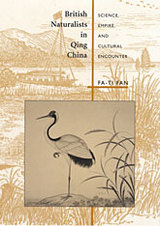
In the eighteenth and nineteenth centuries, Western scientific interest in China focused primarily on natural history. Prominent scholars in Europe as well as Westerners in China, including missionaries, merchants, consular officers, and visiting plant hunters, eagerly investigated the flora and fauna of China. Yet despite the importance and extent of this scientific activity, it has been entirely neglected by historians of science.
This book is the first comprehensive study on this topic. In a series of vivid chapters, Fa-ti Fan examines the research of British naturalists in China in relation to the history of natural history, of empire, and of Sino-Western relations. The author gives a panoramic view of how the British naturalists and the Chinese explored, studied, and represented China's natural world in the social and cultural environment of Qing China.
Using the example of British naturalists in China, the author argues for reinterpreting the history of natural history, by including neglected historical actors, intellectual traditions, and cultural practices. His approach moves beyond viewing the history of science and empire within European history and considers the exchange of ideas, aesthetic tastes, material culture, and plants and animals in local and global contexts. This compelling book provides an innovative framework for understanding the formation of scientific practice and knowledge in cultural encounters.
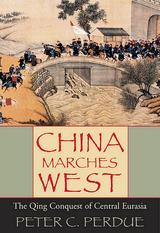
From about 1600 to 1800, the Qing empire of China expanded to unprecedented size. Through astute diplomacy, economic investment, and a series of ambitious military campaigns into the heart of Central Eurasia, the Manchu rulers defeated the Zunghar Mongols, and brought all of modern Xinjiang and Mongolia under their control, while gaining dominant influence in Tibet. The China we know is a product of these vast conquests.
Peter C. Perdue chronicles this little-known story of China’s expansion into the northwestern frontier. Unlike previous Chinese dynasties, the Qing achieved lasting domination over the eastern half of the Eurasian continent. Rulers used forcible repression when faced with resistance, but also aimed to win over subject peoples by peaceful means. They invested heavily in the economic and administrative development of the frontier, promoted trade networks, and adapted ceremonies to the distinct regional cultures.
Perdue thus illuminates how China came to rule Central Eurasia and how it justifies that control, what holds the Chinese nation together, and how its relations with the Islamic world and Mongolia developed. He offers valuable comparisons to other colonial empires and discusses the legacy left by China’s frontier expansion. The Beijing government today faces unrest on its frontiers from peoples who reject its autocratic rule. At the same time, China has launched an ambitious development program in its interior that in many ways echoes the old Qing policies.
China Marches West is a tour de force that will fundamentally alter the way we understand Central Eurasia.

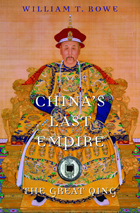
In a brisk revisionist history, William Rowe challenges the standard narrative of Qing China as a decadent, inward-looking state that failed to keep pace with the modern West.
The Great Qing was the second major Chinese empire ruled by foreigners. Three strong Manchu emperors worked diligently to secure an alliance with the conquered Ming gentry, though many of their social edicts—especially the requirement that ethnic Han men wear queues—were fiercely resisted. As advocates of a “universal” empire, Qing rulers also achieved an enormous expansion of the Chinese realm over the course of three centuries, including the conquest and incorporation of Turkic and Tibetan peoples in the west, vast migration into the southwest, and the colonization of Taiwan.
Despite this geographic range and the accompanying social and economic complexity, the Qing ideal of “small government” worked well when outside threats were minimal. But the nineteenth-century Opium Wars forced China to become a player in a predatory international contest involving Western powers, while the devastating uprisings of the Taiping and Boxer rebellions signaled an urgent need for internal reform. Comprehensive state-mandated changes during the early twentieth century were not enough to hold back the nationalist tide of 1911, but they provided a new foundation for the Republican and Communist states that would follow.
This original, thought-provoking history of China’s last empire is a must-read for understanding the challenges facing China today.

In the traditional Chinese symbolic vocabulary, the construction of gender was never far from debates about ritual propriety, desire, and even cosmic harmony. Competing Discourses maps the aesthetic and semantic meanings associated with gender in the Ming-Qing vernacular novel through close readings of five long narratives: Marriage Bonds to Awaken the World, Dream of the Red Chamber, A Country Codger's Words of Exposure, Flowers in the Mirror, and A Tale of Heroic Lovers.
Epstein argues that the authors of these novels manipulated gendered terms to achieve structural coherence. These patterns are, however, frequently at odds with other gendered structures in the texts, and authors exploited these conflicts to discuss the problem of orthodox behavior versus the cult of feeling.
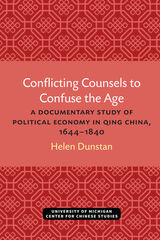

The long seventeenth century in China was a period of tremendous commercial expansion, and no literary genre was better equipped to articulate its possibilities than southern drama. As a form and a practice, southern drama was in the business of world-building—both in its structural imperative to depict and reconcile the social whole and in its creation of entire economies dependent on its publication and performance. However, the early modern commercial world repelled rather than engaged most playwrights, who consigned its totems—the merchant and his money—to the margins as sources of political suspicion and cultural anxiety.
In The Cornucopian Stage, Ariel Fox examines a body of influential yet understudied plays by a circle of Suzhou playwrights who enlisted the theatrical imaginary to very different ends. In plays about long-distance traders and small-time peddlers, impossible bargains and broken contracts, strings of cash and storehouses of silver, the Suzhou circle placed commercial forms not only at center stage but at the center of a new world coming into being. Here, Fox argues, the economic character of early modern selfhood is recast as fundamentally productive—as the basis for new subject positions, new kinds of communities, and new modes of art.

In this study of desire in Late Imperial China, Martin W. Huang argues that the development of traditional Chinese fiction as a narrative genre was closely related to changes in conceptions of the fundamental nature of desire. He further suggests that the rise of vernacular fiction during the late Ming dynasty should be studied in the context of contemporary debates on desire, along with the new and complex views that emerged from those debates.
Desire and Fictional Narrative in Late Imperial China shows that the obsession of authors with individual desire is an essential quality that defines traditional Chinese fiction as a narrative genre. Thus the maturation of the genre can best be appreciated in terms of its increasingly sophisticated exploration of the phenomenon of desire.

This volume addresses cultural and literary transformation in the late Ming (1550-1644) and late Qing (1851-1911) eras. Although conventionally associated with a devastating sociopolitical crisis, each of these periods was also a time when Chinese culture was rejuvenated. Focusing on the twin themes of crisis and innovation, the seventeen chapters in this book aim to illuminate the late Ming and late Qing as eras of literary-cultural innovation during periods of imperial disintegration; to analyze linkages between the two periods and the radical heritage they bequeathed to the modern imagination; and to rethink the "premodernity" of the late Ming and late Qing in the context of the end of the age of modernism.
The chapters touch on a remarkably wide spectrum of works, some never before discussed in English, such as poetry, drama, full-length novels, short stories, tanci narratives, newspaper articles, miscellanies, sketches, familiar essays, and public and private historical accounts. More important, they intersect on issues ranging from testimony about dynastic decline to the negotiation of authorial subjectivity, from the introduction of cultural technology to the renewal of literary convention.

During the Manchu conquest of China (1640s–1680s), the Qing government mandated that male subjects shave their hair following the Manchu style. It was a directive that brought the physical body front and center as the locus of authority and control. Feeling the Past in Seventeenth-Century China highlights the central role played by the body in writers’ memories of lived experiences during the Ming-Qing cataclysm. For traditional Chinese men of letters, the body was an anchor of sensory perceptions and emotions. Sight, sound, taste, and touch configured ordinary experiences next to traumatic events, unveiling how writers participated in an actual and imagined community of like-minded literary men.
In literature from this period, the body symbolizes the process by which individual memories transform into historical knowledge that can be transmitted across generations. The ailing body interprets the Manchu presence as an epidemic to which Chinese civilization is not immune. The bleeding body, cast as an aesthetic figure, helps succeeding generations internalize knowledge inherited from survivors of dynastic conquest as a way of locating themselves in collective remembrance. This embodied experience of the past reveals literature’s mission of remembrance as, first and foremost, a moral endeavor in which literary men serve as architects of cultural continuity.

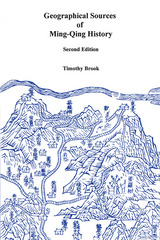

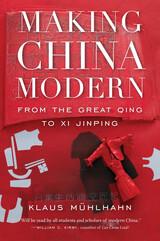
“Thoughtful, probing…a worthy successor to the famous histories of Fairbank and Spence [that] will be read by all students and scholars of modern China.”
—William C. Kirby, coauthor of Can China Lead?
It is tempting to attribute the rise of China to Deng Xiaoping and to recent changes in economic policy. But China has a long history of creative adaptation. In the eighteenth century, the Qing Empire dominated a third of the world’s population. Then, as the Opium Wars and the Taiping Rebellion ripped the country apart, China found itself verging on free fall. More recently, after Mao, China managed a surprising recovery, rapidly undergoing profound economic and social change. A dynamic story of crisis and recovery, failure and triumph, Making China Modern explores the versatility and resourcefulness that guaranteed China’s survival, powered its rise, and will determine its future.
“Chronicles reforms, revolutions, and wars through the lens of institutions, often rebutting Western impressions.”
—New Yorker
“A remarkable accomplishment. Unlike an earlier generation of scholarship, Making China Modern does not treat China’s contemporary transformation as a postscript. It accepts China as a major and active player in the world, places China at the center of an interconnected and global network of engagement, links domestic politics to international dynamics, and seeks to approach China on its own terms.”
—Wen-hsin Yeh, author of Shanghai Splendor


In this groundbreaking interdisciplinary study, Maram Epstein identifies filial piety as the dominant expression of love in Qing dynasty texts. At a time when Manchu regulations made chastity the primary metaphor for obedience and social duty, filial discourse increasingly embraced the dramatic and passionate excesses associated with late-Ming chastity narratives.
Qing texts, especially those from the Jiangnan region, celebrate modes of filial piety that conflicted with the interests of the patriarchal family and the state. Analyzing filial narratives from a wide range of primary texts, including local gazetteers, autobiographical and biographical nianpu records, and fiction, Epstein shows the diversity of acts constituting exemplary filial piety. This context, Orthodox Passions argues, enables a radical rereading of the great novel of manners The Story of the Stone (ca. 1760), whose absence of filial affections and themes make it an outlier in the eighteenth-century sentimental landscape. By decentering romantic feeling as the dominant expression of love during the High Qing, Orthodox Passions calls for a new understanding of the affective landscape of late imperial China.

The Qing dynasty office purchase system (juanna), which allowed individuals to pay for appointments in the government, was regarded in traditional Chinese historiography as an inherently corrupt and anti-meritocratic practice. It enabled participants to become civil and military officials while avoiding the competitive government-run examination systems.
Lawrence Zhang’s groundbreaking study of a broad selection of new archival and other printed evidence—including a list of over 10,900 purchasers of offices from 1798 and narratives of purchase—contradicts this widely held assessment and investigates how observers and critics of the system, past and present, have informed this questionable negative view. The author argues that, rather than seeing office purchase as a last resort for those who failed to obtain official appointments via other means, it was a preferred method for wealthy and well-connected individuals to leverage their social capital to the fullest extent. Office purchase was thus not only a useful device that raised funds for the state, but also a political tool that, through literal investments in their positions and their potential to secure status and power, tied the interests of official elites ever more closely to those of the state.

The Qing dynasty office purchase system (juanna), which allowed individuals to pay for appointments in the government, was regarded in traditional Chinese historiography as an inherently corrupt and anti-meritocratic practice. It enabled participants to become civil and military officials while avoiding the competitive government-run examination systems.
Lawrence Zhang’s groundbreaking study of a broad selection of new archival and other printed evidence—including a list of over 10,900 purchasers of offices from 1798 and narratives of purchase—contradicts this widely held assessment and investigates how observers and critics of the system, past and present, have informed this questionable negative view. The author argues that, rather than seeing office purchase as a last resort for those who failed to obtain official appointments via other means, it was a preferred method for wealthy and well-connected individuals to leverage their social capital to the fullest extent. Office purchase was thus not only a useful device that raised funds for the state, but also a political tool that, through literal investments in their positions and their potential to secure status and power, tied the interests of official elites ever more closely to those of the state.

“Precious volumes,” or pao-chüan, were produced by popular sects in the Ming and early Qing dynasties. These scriptures were believed to have been divinely revealed to sect leaders and contain teachings and ritual instructions that provide valuable information about a lively and widespread religious tradition outside mainstream Confucianism, Taoism, and Buddhism. Largely neglected until now, they testify to the imagination and devotion of popular religious leaders.
This book, the most detailed and comprehensive study of pao-chüan in any language, studies 34 early examples of this literature in order to understand the origins and development of this textual tradition. Although the work focuses on content and structure, it also treats the social context of these works as well as their transmission and ritual use.
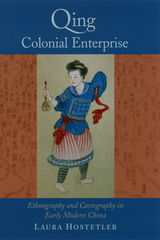
Although mapping in China is almost as old as Chinese civilization itself, the Qing insistence on accurate, to-scale maps of their territory was a new response to the difficulties of administering a vast and growing empire. Likewise, direct observation became increasingly important to Qing ethnographic writings, such as the illustrated manuscripts known as "Miao albums" (from which twenty color paintings are reproduced in this book). These were intended to educate Qing officials about various non-Han peoples so that they could govern these groups more effectively.Hostetler's groundbreaking account will interest anyone studying the history of the early modern period and colonialism.

What did it mean to run a large, commercialized agrarian polity according to the best Confucian principles?
This book is intended as a contribution to both intellectual and political history. It is partly a study of how Confucian-trained officials thought about the grain trade and the state's role in it, particularly the "ever-normal granaries," the stockpiles of grain maintained by every county government as protection against shortages and high prices. The author investigates the scope and limits of belief in market forces among those critical of government intervention, establishing that rudimentary economic arguments for state withdrawal from the grain trade were available by 1750. She then explores challenges, from within the ruling apparatus, to the state's claim that its own stockpiling served the public interest, as well as the factors behind decisions in the mid- and late 1740s to suspend or decrease state purchases of grain.
As a study of Confucian government in action, this book describes a mode of public policy discussion far less dominated by the Confucian scriptures than one might expect. As a contribution to intellectual history, the work offers a detailed view of members of an ostensibly Confucian government pursuing divergent agendas around the question of "state or merchant?"

The civil service examination essay known as shiwen (modern or contemporary prose) or bagu wen (eight-legged essay) for its complex structure was the most widely read and written literary genre in early modern China (1450–1850). As the primary mode of expression in which educated individuals were schooled, shiwen epitomized the literary enterprise even beyond the walls of the examination compound. But shiwen suffered condemnation in the shift in discourse on literary writing that followed the fall of the Ming dynasty, and were thoroughly rejected in the May Fourth iconoclasm of the early twentieth century.
Challenging conventional disregard for the genre, Alexander Des Forges reads the examination essay from a literary perspective, showing how shiwen redefined prose aesthetics and transformed the work of writing. A new approach to subjectivity took shape: the question “who is speaking?” resonated through the essays’ involuted prose style, foregrounding issues of agency and control. At the same time, the anonymity of the bureaucratic evaluation process highlighted originality as a literary value. Finally, an emphasis on questions of form marked the aesthetic as a key arena for contestation of authority as candidates, examiners, and critics joined to form a dominant social class of literary producers.

The collapse of the Ming dynasty and the Manchu conquest of China were traumatic experiences for Chinese intellectuals, not only because of the many decades of destructive warfare but also because of the adjustments necessary to life under a foreign regime. History became a defining subject in their writings, and it went on shaping literary production in succeeding generations as the Ming continued to be remembered, re-imagined, and refigured on new terms.
The twelve chapters in this volume and the introductory essays on early Qing poetry, prose, and drama understand the writings of this era wholly or in part as attempts to recover from or transcend the trauma of the transition years. By the end of the seventeenth century, the sense of trauma had diminished, and a mood of accommodation had taken hold. Varying shades of lament or reconciliation, critical or nostalgic retrospection on the Ming, and rejection or acceptance of the new order distinguish the many voices in these writings.

Uncertainty in the Empire of Routine investigates the administrative revolution of China’s eighteenth-century Qing state. It begins in the mid-seventeenth century with what seemed, at the time, to be straightforward policies to clean up the bureaucracy: a regulation about deadlines here, a requirement about reporting standards there. Over the course of a hundred years, the central court continued to demand more information from the provinces about local administrative activities. By the middle of the eighteenth century, unprecedented amounts of data about local offices throughout the empire existed.
The result of this information coup was a growing discourse of crisis and decline. Gathering data to ensure that officials were doing their jobs properly, it turned out, repeatedly exposed new issues requiring new forms of scrutiny. Slowly but surely, the thicket of imperial routines and standards binding together local offices, provincial superiors, and central ministries shifted the very epistemological foundations of the state. A vicious cycle arose whereby reporting protocols implemented to solve problems uncovered more problems, necessitating the collection of more information. At the very moment that the Qing knew more about itself than ever before, the central court became certain that it had entered an age of decline.

The Ming–Qing dynastic transition in seventeenth-century China was an epochal event that reverberated in Qing writings and beyond; political disorder was bound up with vibrant literary and cultural production. Women and National Trauma in Late Imperial Chinese Literature focuses on the discursive and imaginative space commanded by women. Encompassing writings by women and by men writing in a feminine voice or assuming a female identity, as well as writings that turn women into a signifier through which authors convey their lamentation, nostalgia, or moral questions for the fallen Ming, the book delves into the mentality of those who remembered or reflected on the dynastic transition, as well as those who reinvented its significance in later periods. It shows how history and literature intersect, how conceptions of gender mediate the experience and expression of political disorder.
Why and how are variations on themes related to gender boundaries, female virtues, vices, agency, and ethical dilemmas used to allegorize national destiny? In pursuing answers to these questions, Wai-yee Li explores how this multivalent presence of women in different genres provides a window into the emotional and psychological turmoil of the Ming–Qing transition and of subsequent moments of national trauma.

This book examines the widespread practice of self-publishing by writers in late imperial China, focusing on the relationships between manuscript tradition and print convention, peer patronage and popular fame, and gift exchange and commercial transactions in textual production and circulation.
Combining approaches from various disciplines, such as history of the book, literary criticism, and bibliographical and textual studies, Suyoung Son reconstructs the publishing practices of two seventeenth-century literati-cum-publishers, Zhang Chao in Yangzhou and Wang Zhuo in Hangzhou, and explores the ramifications of these practices on eighteenth-century censorship campaigns in Qing China and Chosŏn Korea. By giving due weight to the writers as active agents in increasing the influence of print, this book underscores the contingent nature of print’s effect and its role in establishing the textual authority that the literati community, commercial book market, and imperial authorities competed to claim in late imperial China.
READERS
Browse our collection.
PUBLISHERS
See BiblioVault's publisher services.
STUDENT SERVICES
Files for college accessibility offices.
UChicago Accessibility Resources
home | accessibility | search | about | contact us
BiblioVault ® 2001 - 2024
The University of Chicago Press









